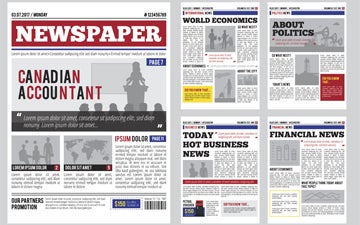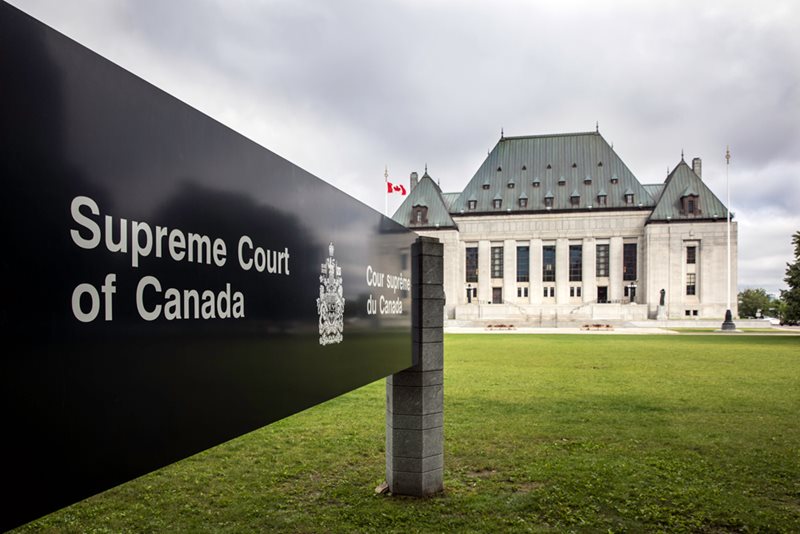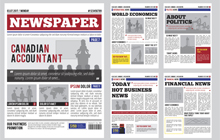Sunday News Roundup 23.05.28: The Deans Knight Rises, Big Four soaps, and more Canadian accounting news

Wrapping up the odds and ends from the past week in Canadian accounting news
Subscribe to our weekly newsletter and get all the week’s stories. Click here to sign up.
TORONTO, May 28, 2023 – Tax professionals were reeling this past week by a 7-1 decision by the Supreme Court of Canada in Deans Knight Income Corp. v. Canada. Given the string of high-profile SCC losses suffered by the Crown in recent years, most observers were expecting the clever tax avoidance strategies of the investment firm to win the day. Instead, the ruling stops the company from claiming $47-million in tax losses, and now it looks like Deans Knight is going out of business.
We will have much more on Deans Knight in the weeks to come — expect a ton of legal commentary on the case — but there are a few aspects of the case to highlight. First, this was a high-stakes case, with the Canadian Chamber of Commerce, the Tax Executives Institute, the Attorney General of Ontario and more all securing intervenor status.
Second, as soon as we heard a “7-1 decision,” we knew who the “one” was — the Great Dissenter (and former corporate lawyer), Justice Suzanne Côté. Expect to read a lot of commentary in the coming weeks that focuses on her objections to the majority decision. Third, we were pleased to see that, not only had we published the opinions of the case’s tax lawyers in Canadian Accountant, but Vern Krishna, whose articles we regularly published, was cited throughout the decision (by both sides).
Finally, many legal and tax professionals toss around “Duke of Westminster principle” as a kind of catch-all phrase to defend their positions on tax-avoidance schemes. Finally, in Deans Knight, we got some clarity on that principle from the highest court in the land:
The Duke of Westminster principle, however, has “never been absolute” (Lipson, at para. 21) and it is open to Parliament to derogate from it. Parliament has done so through the GAAR. The GAAR does not displace the Duke of Westminster principle for legitimate tax planning. Rather, it recognizes a difference between legitimate tax planning — which represents the vast majority of transactions and remains unaffected, consistent with the Duke of Westminster principle — and tax planning that operates to abuse the rules of the tax system — in which case the integrity of the tax system is preserved by denying the tax benefit, notwithstanding the transactions’ compliance with the provisions relied upon.
Even the good folks at BLG Law saw the case as an opportunity to clarify, with “much needed certainty,” the role and application of GAAR in the Canadian tax regime. Perhaps, because they represented the Canadian Chamber of Commerce before the SCC, BLG sees no reason for the government to “to further tilt the playing field in favour of the government in GAAR cases,” since the Deans Knight appeal was quashed.
And now, on to the rest of the news and links from the past week in Canadian accounting.
 |
Justice Suzanne Côté disagreed with the majority decision saying the decision was ad hoc and "invites the exercise of unbounded judicial discretion." (Image: iStock) |
Now Playing: EY Global, PwC Australia soap operas
Have you been watching the Big Four dramas playing out to an international audience? Let’s start out with the PwC tax leaks scandal currently on screens in Australia. At stake is millions of dollars in government consulting contracts, because a former partner used secret government tax information to try to get the business of California tech companies. This week, the Australian Financial Review said the PwC scandal makes a case for breaking up the big four, and The Guardian reported the matter has been referred to police, with the Treasury Department ordering some PwC employees to “stand down” from government contracts.
Reports out of Australia early Monday morning (late Sunday night in Canada) have acting chief executive Kristin Stubbins apologizing on behalf of PwC Australia and putting nine partners on leave. But we have seen this scenario play out in different ways in the past few years elsewhere — most notably in the UK — some public committees, some performative insults from politicians (does anyone remember, “I wouldn’t hire you to do an audit of the contents of my fridge,” fired at a UK KPMG executive?), but no real change occurring after multiple Big Four audit failures.
Want proof? This week, Bloomberg Tax reported the Institute of Chartered Accountants in England and Wales, is sitting on US$183-million in fines levied over the scandals by the country’s regulatory watchdog. A cynic would say that the Big Four are far too powerful — and governments too besotted with external consultants rather than internal expertise — for anything truly interesting to happen.
Meanwhile, over at EY US, top dog Julie Boland has “reshuffled the firm’s leadership, elevating loyalists after winning a power struggle with the Big Four accounting firm’s global bosses that scuppered a plan to spin off its consulting arm,” according to the Financial Times.
And Bloomberg Tax reported that, “Boland and Carmine Di Sibio, EY’s global chairman and CEO, face pressure from partners frustrated over the infighting and demise of the the deal and questioning whether either are fit to continue leading the Big Four firm.”
CRA union picks at scabs
Speaking of soap operas, the Union of Taxation Employees says they are looking for CRA workers who chose to continue working (i.e., scabs) while their union siblings were on the picket line. (The national president of the union, according to the CBC, says tracking them down will not be easy, given remote work and essential worker status.
The news comes just a couple weeks after the union disclosed that hundreds of workers whose contracts were ending will lose out on signing bonuses. We can imagine the disappointment of contract workers who walked the picket lines in good faith only to get shafted in the end. The CRA workers even stayed out an extra couple days, splitting from the negotiations of its parent union, in hopes of a better deal that never came.
Our thoughts? Here’s why the Canada Revenue Agency tax workers strike was good for Canadian accountants.
Quick Hits: Articles of Interest
Canadian
Senate bill on overseas tax evasion would force transparency about Canada’s tax gap: Senator Downe (SenCA+ Magazine)
B.C. bookkeeper used numbered company to assist major U.S. fraud, SEC finds (Glacier Media)
Do you know what’s a material change in IFRS 17? (Canadian Underwriter)
Americans should be exempt from Canada's foreign housing tax, members of Congress say (Canadian Press)
Shrinkflation is getting worse in Canada — and it could mean paying more taxes (National Post)
Alberta NDP promises to bring back digital tax credit; wins endorsement from Nenshi (CityNews)
International
Grant Thornton is the Latest Large Firm to Get Rid of Staff (CPA Practice Advisor)
By Canadian Accountant staff.



(0) Comments